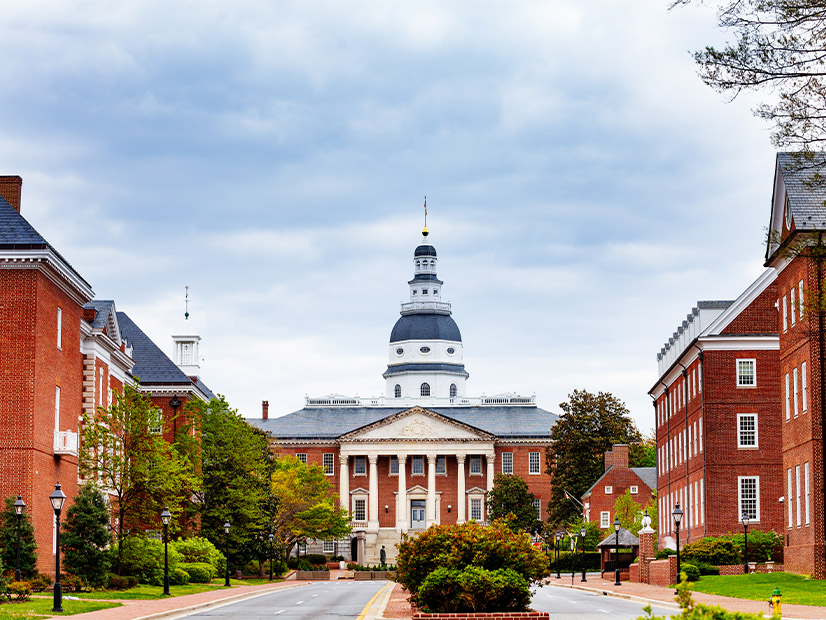Getting bills through the Maryland General Assembly often involves compromises and tradeoffs, even with Democrats controlling the House of Delegates, the Senate and the governorship.
So, compromises and some controversy were very much in the mix for energy bills and programs as the General Assembly raced toward the official close of its 2024 legislative session at 11:59 p.m. April 8.
The passage of S.B. 474, aimed at allowing data centers to use fossil fuel-powered backup power, was achieved via a controversial compromise. Introduced by Senate President Bill Ferguson (D), the bill would exempt facilities, such as data centers, using fossil-fuel generation for emergency backup power from having to apply to the Maryland Public Service Commission for a certificate of public convenience and necessity (CPCN).
The impetus for the bill was the PSC’s refusal last year to approve a CPCN for a proposed data center with 168 backup diesel generators in Frederick County, which prompted the center’s developer to pull out of the project.
The bill had strong support from Gov. Wes Moore (D), who is seeking to draw data centers to Maryland as their development booms in Northern Virginia, but it ran into opposition from environmental groups. The Maryland League of Conservation Voters had opposed the bill and said it would include lawmakers’ votes on it in its annual legislative scorecard.
But the LCV was mollified with an amendment that would channel 15% of the tax revenues raised from data centers in the state into a fund for clean energy projects, according to a report on Maryland Matters. Both houses of the legislature passed the bill unanimously.
Compromise amendments also secured passage of the Distributed Renewable Integration and Vehicle Electrification (DRIVE) Act (H.B 1256), which seeks to promote “beneficial electrification” via time-of-use (TOU) rates for residential customers and bidirectional electric vehicle charging.
TOU rates set high per-kilowatt-hour prices during times of peak demand and significantly lower prices for off-peak hours, with the goal of encouraging residential customers to shift their energy use.
As originally introduced by Del. David Fraser-Hidalgo (D), the bill would have required default TOU rates, with an opt-out choice for residential customers, but was amended to allow Maryland’s investor-owned utilities to launch pilot, voluntary TOU programs with specific targets for customers to opt in to the rates. By July 1, 2026, the utilities would have to report to the PSC on whether TOU rates had helped defer distribution system upgrades and on the feasibility of making TOU rates the default choice for residential customers.
The bill would also direct the PSC to establish “expedited processes for interconnecting” bidirectional EV chargers. Utilities would also be required to develop rates for compensating customers who feed power back into the grid via a bidirectional charger.
The vote was 100-39 in the House and 47-0 in the Senate.
A House-Senate conference committee was needed to hash out final amendments for H.B. 864, which would update the state’s energy efficiency and conservation plans ― in particular, the EmPOWER Maryland program for low-income consumers.
The bill would require both electric and gas utilities to meet energy savings and emission-reduction targets that are in line with the state’s goals while expanding the definition of efficiency to include both demand response and electrification. It would set 2016 as the base year and require utilities to develop efficiency programs that cut emissions from retail sales 2% below the base in 2024, 2.25%/year in 2025 and 2026, and 2.5%/year beyond.
Other provisions call on the state Department of Housing and Community Development to develop energy efficiency programs specifically for low-income residents and direct the PSC to establish a working group to examine how efficiency programs can be extended to moderate-income residents.
H.B. 864 had strong support from environmental groups, passing 100-36 in the House and 32-12 in the Senate.
Environmental advocates and the Maryland Energy Administration (MEA) called foul over an amendment slipped into the must-pass budget bill that would block funding for the agency to set building performance standards, as reported in Maryland Matters.
The amendment would put a hold on funding for MEA to set a metric of building energy efficiency called energy use intensity (EUI), which expresses energy use as a function of building size and other characteristics. The amendment would delay the setting of EUIs ― and building performance standards ― until MEA completes a study on the feasibility of the state’s greenhouse gas reduction goals for the building sector, set at 20% by 2030 in the Climate Solutions Now Act (CSNA) of 2022.
The budget bill (S.B. 360) passed April 5, 44-0 in the Senate and 124-9 in the House.
OSW Reset, Geothermal Pilot
H.B. 1296 is aimed at boosting Maryland’s flagging offshore wind industry, which has faced the same inflation and supply chain challenges that have stalled out other offshore wind projects along the East Coast.
The bill would direct the PSC to open a new proceeding by June 1 to re-evaluate “certain offshore wind projects” while allowing developers to resubmit their applications with revised schedules, sizes and pricing, including prices for the state’s offshore renewable energy certificates (ORECs).
Danish offshore developer Ørsted canceled its agreement with Maryland for the 966-MW Skipjack Wind project, saying the OREC price it had previously negotiated was no longer economically viable. When it announced the cancellation in January, Ørsted said it would continue to develop the project in the hopes of getting a better deal in the future. (See Ørsted Cancels Skipjack Wind Agreement with Maryland.)
The bill passed the House 97-36 and the Senate 34-11.
The Working for Accessible Renewable Maryland Thermal Heat (WARMTH) Act (H.B. 397) is a first step in exploring the use of geothermal energy to replace natural gas. The bill would require gas companies with more than 75,000 customers to develop and submit to the PSC plans for pilot geothermal networks, which are closed-loop geothermal systems that tap the planet’s natural warmth to provide heat and cooling to multiple homes.
Gas companies with fewer than 75,000 customers can — but are not required to — submit geothermal plans. After the pilot, the PSC, MEA, the Office of People’s Counsel and other stakeholders would decide whether to make the projects permanent.
With minor amendments, the House passed the WARMTH Act by a 98-34 vote, and the Senate by 36-9.
Green Buildings and Power
S.B. 258 was passed without major amendments. Despite the budget cuts to MEA’s work on building performance standards, the bill would raise energy savings targets for state buildings from 10% in 2029 to 20% in 2031.
Other provisions call on the Maryland Green Building Council to update the High Performance Green Building Program to help the state meet the goal of cutting emissions 60% below 2006 levels by 2031, set in the CSNA.
The bill would also require the state’s Department of General Services to identify state buildings that could benefit from energy performance contracts, in which third-party efficiency providers guarantee a certain level of energy and dollar savings. If the targets are not met, the provider pays a penalty.
The vote was 37-9 in the Senate and 103-34 in the House.
S.B. 1, sponsored by Sen. Malcolm Augustine (D), would require the state’s retail electricity providers that offer “green power” to their customers to document whether they actually are selling electricity generated by a renewable power project or the renewable energy certificates (RECs) from a project that could be located outside the state.
To offer green power, a retail supplier must show that the electricity being provided is at least 51% from renewables or RECs or at least 1% more than the amount of clean power required under the state’s renewable portfolio standard. For 2024, the state’s RPS calls for about 37% of Maryland’s power to come from renewables, but Gov. Moore has committed the state to 100% clean power by 2031.
Prices for green power would be set through a yearly proceeding before the PSC, and retailers would have to have visible disclosures on their websites explaining that the purchase of a REC did not necessarily mean renewable energy also had been purchased.
The green power provisions are part of a larger bill focused on regulation of retail power suppliers. S.B. 1 passed 32-15 in the Senate and 96-39 in the House.
H.B. 990 updates provisions in the 2016 Greenhouse Gas Reduction Act and the CSNA exempting the state’s manufacturing sector from complying with any state GHG-reduction goals. Cement manufacturing would be taken out of the definition of manufacturing — meaning cement manufacturers in the state would have to comply with GHG-reduction targets.
Manufacturers that are producing renewable energy components or other technology that reduces greenhouse gas emissions would be exempted, as would companies producing alternative materials that reduce emissions.
The bill passed in the House 103-34 and in the Senate 31-12.


